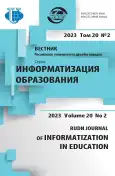Учебная аналитика в России и мире: уровень развития, основные тренды и перспективы
- Авторы: Кустицкая Т.А.1, Носков М.В.1
-
Учреждения:
- Сибирский федеральный университет
- Выпуск: Том 20, № 2 (2023)
- Страницы: 150-158
- Раздел: МЕНЕДЖМЕНТ ОБРАЗОВАТЕЛЬНЫХ ОРГАНИЗАЦИЙ В ИНФОРМАЦИОННУЮ ЭПОХУ
- URL: https://journal-vniispk.ru/2312-8631/article/view/321278
- DOI: https://doi.org/10.22363/2312-8631-2023-20-2-150-158
- EDN: https://elibrary.ru/KEROFN
- ID: 321278
Цитировать
Полный текст
Аннотация
Постановка проблемы. Учебная аналитика - относительно новое научное направление, исследующее учебный процесс и самих обучающихся по данным из цифровой образовательной среды. Цель исследования - определить текущий уровень, перспективы и ограничения развития аналитики обучения, выявить состояние этой научной области в России. Методология. Проведен контент-анализ научных публикаций по направлению исследования, находящихся в открытом доступе. Особое внимание уделено русскоязычным публикациям, посвященным анализу образовательных данных и внедрению инструментов учебной аналитики в образовательный процесс. Результаты. Определены и описаны общемировые тенденции и проблемные аспекты развития учебной аналитики. Представлены результаты количественного и качественного анализа научных публикаций русскоязычных авторов, определены наиболее популярные исследовательские вопросы в данной сфере. Предложено авторское видение направлений развития учебной аналитики, включающее научно-исследовательский аспект, аспекты преобразования образовательной среды и правового регулирования. Рассмотрены национальные инициативы в сфере цифровизации образования. Заключение. Выявлено некоторое отставание уровня развития учебной аналитики в России от общемирового. Вместе с тем наблюдается заметный рост интереса к этой сфере среди отдельных исследователей, образовательных учреждений и на государственном уровне, что позволяет рассчитывать на позитивные изменения.
Ключевые слова
Об авторах
Татьяна Алексеева Кустицкая
Сибирский федеральный университет
Автор, ответственный за переписку.
Email: tkustitskaya@sfu-kras.ru
ORCID iD: 0000-0001-9854-1259
SPIN-код: 5202-8701
кандидат физико-математических наук, доцент, доцент кафедры прикладной математики и компьютерной безопасности
Российская Федерация, 660041, Красноярск, Свободный пр-кт, д. 79Михаил Валерианович Носков
Сибирский федеральный университет
Email: MNoskov@sfu-kras.ru
ORCID iD: 0000-0002-4514-7925
SPIN-код: 3957-7221
доктор физико-математических наук, профессор, профессор кафедры прикладной математики и компьютерной безопасности
Российская Федерация, 660041, Красноярск, Свободный пр-кт, д. 79Список литературы
- Siemens S, Gašević D. Special issue on learning and knowledge analytics. Educational Technology & Society. 2012;15(3):1-163.
- Tsai YS, Rates D, Moreno-Marcos PM, Muñoz-Merino PJ, Jivet I, Scheffel M, Gašević D. Learning analytics in European higher education - trends and barriers. Computers & Education. 2020;155. http://doi.org/10.1016/j.compedu.2020.103933
- Nouri J, Ebner M, Ifenthaler D, Sqr M, Malmberg J, Khalil M, Berthelsen UD. Efforts in Europe for data-driven improvement of education - a review of learning analytics research in six countries. International Journal of Learning Analytics and Artificial Intelligence for Education. 2019;1(1). http://doi.org/10.3991/ijai.v1i1.11053
- Olney T, Walker S, Wood C, Clarke A. Are we living in LA (P) LA Land? Reporting on the practice of 30 STEM tutors in their use of a learning analytics implementation at the open university. Journal of Learning Analytics. 2021;8(3):45-59. http://doi.org/10.18608/jla.2021.7261
- Wong BT, Li KC. A review of learning analytics intervention in higher education (2011-2018). Journal of Computers in Education. 2020;7(1):7-28. http://doi.org/10.1007/s40692-019-00143-7
- Wise AF. Designing pedagogical interventions to support student use of learning analytics. Proceedings of the 4th International Conference on Learning Analytics and Knowledge (24-28 March 2014). Indianopolis; 2014. p. 203-211.
- Wilson A, Watson C, Thompson TL, Drew V, Doyle S. Learning analytics: challenges and limitations. Teaching in Higher Education. 2017;22(8):991-1007. http://doi.org/10.1080/13562517.2017.1332026
- Belonozhko PP, Karpenko AP, Khramov DA. Analysis of educational data: directions and prospects of application. Bulletin of Eurasian Science. 2017;9(4). (In Russ.) Available from: http://naukovedenie.ru/PDF/15TVN417.pdf (accessed: 20.10.2022).
- Nazhmidinov KA. Analysis of the best practices of the use of learning analytics in the foreign universties. Proceedings of the 12th International Scientific-Practical Conference SITU (25 February - 1 March 2019). Ekaterinburg; 2019. p. 172-178. (In Russ.)
- Vilkova KA, Zakharova US. Learning analytics in conventional education: its role and outcomes. University Management: Practice and Analysis. 2020;24(3):59-76. http://doi.org/10.15826/umpa.2020.03.026
- Ozerova GP, Pavlenko GF. Prediction of student performance in blended learning utilizing learning analytics data. Science for Education Today. 2019;9(6):73-87. (In Russ). http://doi.org/10.15293/2658-6762.1906.05
- Bystrova T, Larionova V, Sinitsyn V, Tolmachev A. Learning analytics in massive open online courses as a tool for predicting learner performance. Educational Studies. 2018;4:139-166. http://doi.org/10.21125/iceri.2018.1033
- Aldunin DA. Application of the adaptive content concept for an e-learning resource. Business Informatics. 2016;(4):27-34. http://doi.org/10.17323/1998-0663.2016.4.27.34
- Kustitskaya TA, Karnaukhova OA. Developing an early warning system to detect at-risk students: a feedback mechanism. Proceedings of the 5th International Conference on Informatization of Education and E-learning Methodology: Digital Technologies in Education (6-9 October 2020). Krasnoyarsk; 2020. p. 289-293.
- Baranova EV, Shvetsov GV. Methods and tools for analysing students’ digital footprint in the course of work under educational programmes. Perspectives of Science and Education. 2021;(2):415-430. (In Russ.) http://doi.org/10.32744/pse.2021.2.29
- Alishev T, Gafarov F, Sabitova E. Academic performance and grade 9 milestone: primary data analysis in the system of ”Electronic education in the Republic of Tatarstan”. Kazan Pedagogical Journal. 2020;6:177-186.
- Tolmachev AV, Sinitsyn EV, Astratova GV. Probability distributions of the academic performance of online courses’s students as a tool for assessment of the quality of control materials. Russian Journal of Resources, Conservation and Recycling. 2020;7(3). http://doi.org/10.15862/10INOR320
- Esin TE. Development of the metric of determination probabilistic distance to solution in difficult problem areas. Modeling, Optimization and Information Technology. 2021;9(1). (In Russ.) http://doi.org/10.26102/2310-6018/2021.32.1.006
- Ozerova GP. Design and assessment self-study tasks in blended learning envirinment. Proceedings of Voronezh State University: Problems of Higher Education. 2020;2:82-86. (In Russ.)
Дополнительные файлы









